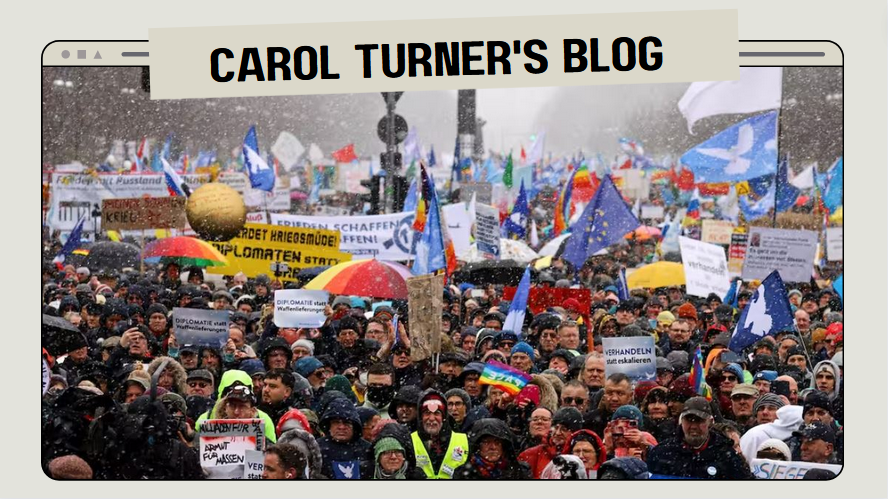On the eve of Saturday’s Peace Talks Now demonstration in London, some readers may have watched the Ukraine war anniversary addition of the BBC’s Newsnight. One year on, a live audience of Ukrainian refugees gave their views and expressed their feelings about the war raging in their country. Who could fail but be moved by their concerns for the fate of their families and friends, the descriptions of what happened to their towns and neighbourhoods, and their hopes and fears for the future?
What struck me most of all, sending a chill down my spine, were the unreal expectations they expressed about the war’s likely end game. One woman’s desire for the war to continue until Putin was crushed and the Crimea and Donbass brought within Ukraine’s borders caused even Mark Urban to raise an eyebrow. The BBC’s Diplomatic Editor, no friend of Russia, felt obliged to highlight ‘the limits of western will’. Recently, he said, ‘it is explicit from the US, Germany, and France that they do not support the reconquest of Crimea.’
The responsibility for such expectations should be laid squarely at the door of the US and UK governments and their media allies whose war fever has encouraged Ukrainians to believe that outright victory and total defeat of Russia is not just possible but likely.
“Calls for escalation point the way to war in Europe and beyond”
In the run up to the 12-month anniversary, President Biden and Prime Minister Sunak have called loud and often for escalating the war in Ukraine. Most noticeably though, they have failed to match their war mongering words with concrete commitments to supply the tanks and aircraft President Zelenskiy is seeking. Biden and Sunak recognise as we do that escalation is the road to war in Europe and beyond, with the possibility of nuclear war.
The actual commitment Biden has made amounts to speeding up the provision of ammunition and imposing further sanctions. Sunak has pledged merely to ‘give serious consideration’ to Zelenskiy’s request for fighter aircraft. Even if aircraft were forthcoming, Sunak points out, it would take months, even years, before they were delivered and the Ukraine military trained to use them.
Behind the beat of western war drums a picture of US strategy begins to emerge – that of embroiling Russia in a long and protracted war which drains the country’s military, economic, and political resources; hoping a weakened Putin will be thrown to the wolves by the Russian people to be replaced by a more malleable leader. Needless to say, such a strategy takes little if any account of the war’s impact on the Ukrainian people. Nor does it acknowledge the possibility that, in extremis, nuclear. weapons might be used.
“Nuclear powers must avert those confrontations which bring an adversary to a choice of either a humiliating retreat or a nuclear war”
Compare the rhetoric of Biden and Sunak, with a speech by President John F Kennedy in 1963, a year on from the Bay of Pigs and just weeks before his assassination. ‘Above all,’ Kennedy said, ‘nuclear powers must avert those confrontations which bring an adversary to a choice of either a humiliating retreat or a nuclear war. To adopt that kind of course in the nuclear age would be evidence only of the bankruptcy of our policy—or of a collective death-wish for the world.’
Disregard for the fate of the peoples and countries in whose name the US and its allies claim to act can be seen in a long line of recent wars – in Yugoslavia in the 1990s, in Afghanistan in 2001, in Iraq in 1991 as well as 2003, in Syria, and in Libya. All of them have left a trail of death and destruction from which each still suffers. This is the real lesson of 21st century wars.
The outcome of a prolonged war in Ukraine is not self-determination, as a few voices in the UK peace movement misguidedly imagine when they support Biden and Sunak’s calls to step up the war. The only way forward is peace talks.
“Backing the calls to step up the war, however unintentional, provide a progressive gloss for warmongering and profiteering”
In backing escalation, however unintentional, these tragically mistaken voices provide a progressive gloss for warmongering and profiteering. The same voices would never be raised in support of the Tories austerity agenda. Why would anyone imagine Johnson, Truss and Sunak have changed their spots when it comes to Ukraine?
On Saturday 25 February 2023, led by the Campaign for Nuclear Disarmament and Stop the War Coalition, the peace movement took to the streets of London to mark the first anniversary, demanding End War in Ukraine! Peace Talks Now! The same demands to stop the war and build the peace are ringing out across Europe – in Italy, Spain, Germany, Switzerland, Croatia, Portugal, Austria, France, Brussels, Poland, the Netherland, and beyond.
CND is part of a growing movement across Europe. Every single one of us who marched on Saturday can be proud that our voices were raised for sanity, for the future of Ukraine, and for the future of the human race. When history is written, and the miasma of rhetoric and lies forgotten, our stand will be a small footnote on history’s pages. That is something we should all be justly proud of.
Carol Turner is co-chair of London Region CND. She is a directly elected member of CND’s National Council and part of the International Advisory Group.
Carol is a long-time peace campaigner, a member of Stop the War Coalition’s National Officer Group, and author of Corbyn and Trident: Labour’s Continuing Controversy.


